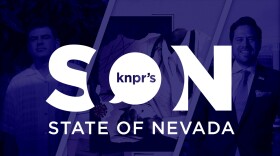It’s no coincidence that March is home to both the NCAA Tournament and National Problem Gambling Awareness Month.
More than $10 billion is wagered on the basketball tournament, making March Madness one of the biggest betting opportunities of the year. It’s also a time when many problem gamblers hit rock bottom in failed bids to turn their luck.
For the last 13 years, the treatment community has designated March as National Problem Gambling Awareness Month. Health care providers and family members are urged “to have the conversation” with those who might be hurting themselves or their families because of gambling.
Keith Whyte, executive director of the National Council on Problem Gambling, said calls to gambling hotlines spike 30 percent in March. Whyte said that is a function of both the flurry of NCAA betting activity and the publicity that surrounds National Problem Gambling Awareness Month.
"It's not just bright light legal gambling in the casinos that can be a problem. It is also sports betting, whether legal or illegal, that occurs across America and certainly peaks during March Madness," Whyte said.
Whyte said a simple way to know if you have a problem is to ask if gambling is causing a problem in your life, not just financially. He said some of the most important signs that the fun has stopped are having a preoccupation with gambling, where it is the only thing you want to focus on, a decrease in tolerance, requiring more and more bets to get the same high from it, and loss of control, which means you are unable to put money or time limits on your gambling and stick with those limits.
Danny is a recovering problem gambler. He experienced all of those problems. His addiction became so destructive that two of his daughters refused to let him walk them down the aisle at their weddings.
It was that feeling of isolation from family and friends that made him finally take treating his addiction seriously. When he did focus on recovering, he eventually mended the relationships with his family to the point where his youngest daughter asked that he walk her down the aisle at her wedding.
Carol O'Hare is the executive director of the Nevada Council on Problem Gambling now, but at one time she had lost almost everything because of her gambling addiction.
It was a word from a friend that changed O'Hare's life and led to her to see that gambling was the problem not the solution. Her friend told her that she could get help at Gamblers Anonymous.
"I'm grateful today that I called one person who knew one thing that I didn't know and as a result of that one piece of information I was able to take one step back and say, 'wait a minute, maybe there is something else happening and maybe there's other options," O'Hare said.
She said that is what Problem Gambling Awareness Month is really about, letting people know about the help that is available to them through groups like Gamblers Anonymous and other treatment programs.
And although Las Vegas attracts people who may already be vulnerable to gambling addiction and provides plenty of places to fed that addiction, it also offers lots of ways to help people for whom gambling has become a problem.
RESOURCES:
1-800-522-4700 or go to www.whenthefunstops.org
Nevada Council on Problem Gambling
Gamblers Anonymous of Southern Nevada
National Council on Problem Gambling
Keith Whyte, executive director of the National Council on Problem Gambling; Carol O’Hare, executive director of the Nevada Council on Problem Gambling; Sydney Smith, Las Vegas therapist who treats problem gamblers; “ Danny,” recovering problem gambler








